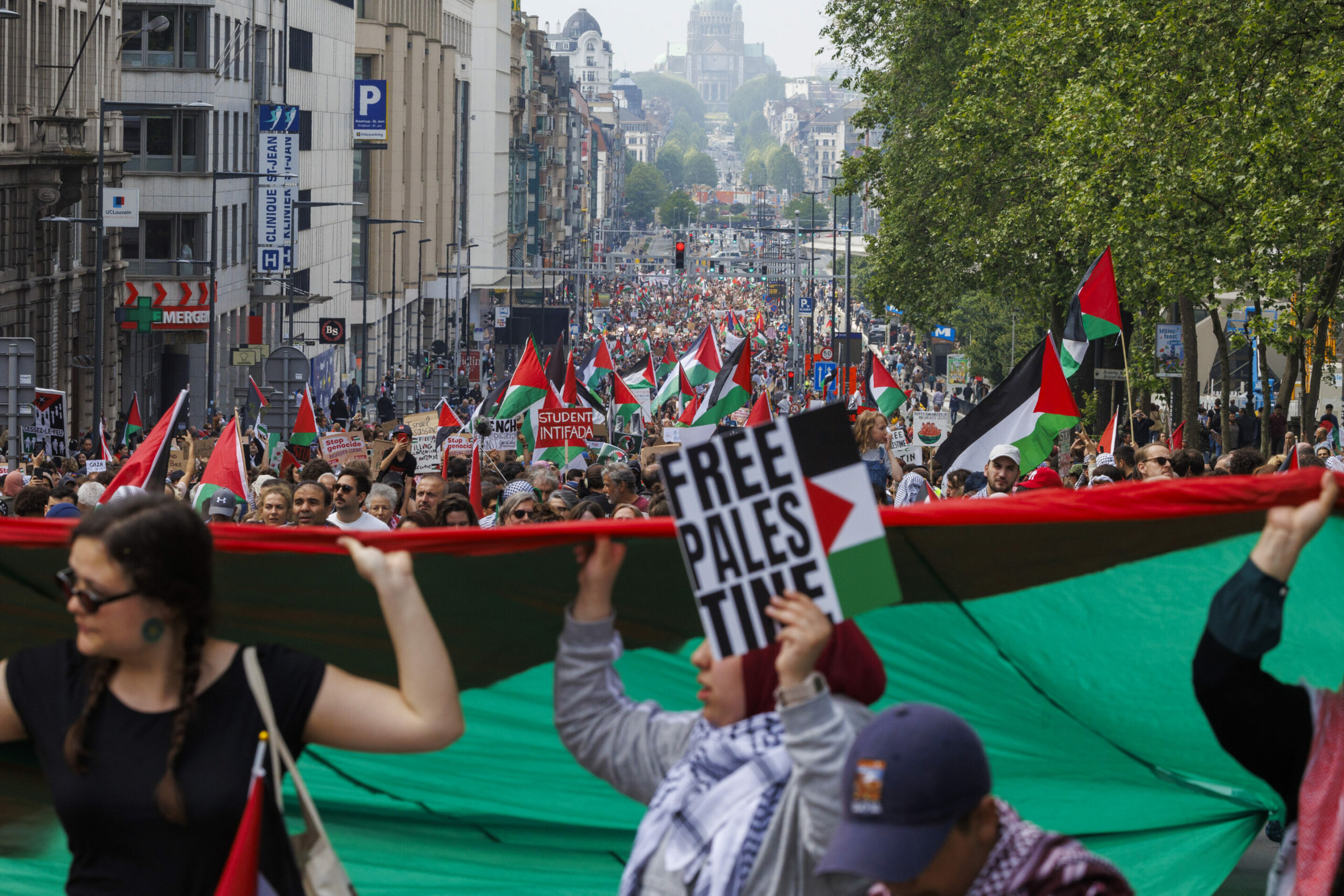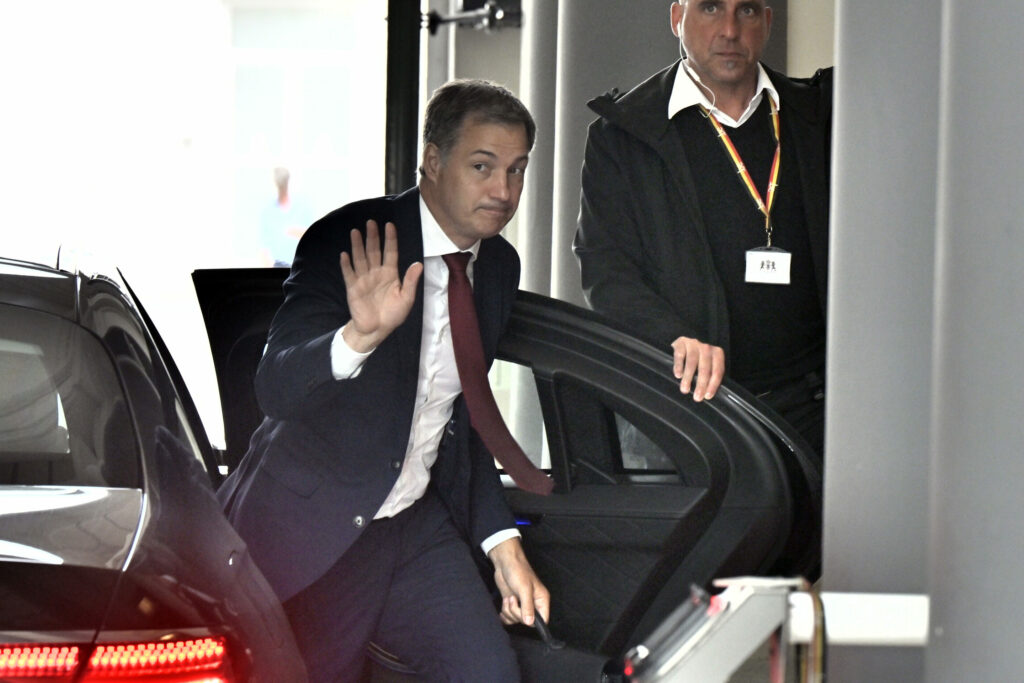The so-called 'core cabinet' of Belgium's Federal Government – the Prime Minister, his seven Deputy PMs and any relevant minister – met on Wednesday afternoon to discuss the possible recognition of a Palestinian state, but failed to reach an agreement.
Belgium's key ministers failed to agree on the recognition of the Palestinian state, various parties told Belga News Agency. In particular, they point to the French-speaking as well as the Flemish liberals, MR and Open VLD, as the reason for the "blocking."
After Spain, Ireland and Norway indicated they would recognise Palestine as a state, Belgium's socialists (PS and Vooruit), Greens (Groen and Ecolo) and Christian-Democrats CD&V stepped up the pressure for the Federal Government to do the same.
'Path to peace and security'
Prime Minister Alexander De Croo, the Deputy Prime Ministers and Federal Development Minister Caroline Gennez (Vooruit) met around noon to consider the dossier, but no agreement was reached by the time the meeting ended.
"In line with what the core cabinet agreed on 19 April, the Federal Government continues to work on the context and framework for a possible recognition of the Palestinian state," sources close to De Croo told Belga News Agency. However, there is no intention for the ministers to return to the issue in the coming weeks. But that is clearly not enough for all parties.
"I regret that some do not have the guts to do what needs to be done: recognise the state of Palestine," said Gennez. "Besides a ceasefire, the release of all hostages and increased humanitarian access, the two-state solution is the only path to peace and security."

The last European march in solidarity with the Palestinian people, Sunday 19 May 2024 in Brussels. Credit: Belga / Nicolas Maeterlinck
This was Belgium's current Federal Government's "last chance" before the elections on 9 June to approve recognition, she stressed. The recognition of Palestine "in a timely manner" was part of the current coalition government agreement from 2020.
"Other countries are showing us how to do it," Gennez continued. "We must be at the forefront of the fight against extremism and I will always continue to fight for the rights of innocent victims."
Deputy Prime Minister Pierre-Yves Dermagne (PS) agreed with Gennez, saying that words of support are no longer enough. "Given the disproportionate retaliation by the Israeli Government and the successive failures of all ceasefire attempts, we are today obliged to act more decisively."
However, the liberal parties are refusing to take this step, particularly the Francophone MR, he stressed. Deputy Prime Minister Petra De Sutter (Groen) also pointed to the liberals as the reason for the lack of decision, calling the fact that the Federal Government cannot unanimously agree to recognise the Palestinian state "incomprehensible."
"The liberals refuse recognition, while that is the basis for peace and security. You do not play political games with human lives," she said.
Two-state solution
Meanwhile, Belgium's Foreign Minister Hadja Lahbib (MR) acknowledged that Spain, Ireland and Norway had taken an "important step" but added that she wants to go beyond "a symbolic recognition" and reiterated that it is now important to seize the moment to get European countries' positions in the same direction.
In any case, all EU Member States agree that there can be no return to the situation before the Hamas attack on 7 October.
The Israeli human rights organisation Peace Now – which has been working for peace between Israel and Palestine since the late 1970s – posted on social media in response to the recognition of Palestinian statehood by Ireland, Norway and Spain. "It is time to recognise that a Palestinian state is inevitable and that Israel is better off initiating the process than being dragged into it."
For Peace Now, only a two-state solution as part of a comprehensive regional initiative would mean security, the return of hostages, a normalisation of the relationship between Israel and Saudi Arabia and an end to Israel's international isolation. "We must end the war and say yes to a two-state solution. That is the real victory."
Related News
- Belgium pledges a further €4 million to help Palestinians
- Belgian minister calls for EU arms embargo on Israel
- Horizon Europe: Can Belgian universities cancel research contracts with Israel?
After the meeting, De Croo said that Belgium will "one day" recognise the Palestinian state. "We will do that when a group of countries does it, and that can be used as a real lever to release hostages and stop the violence."
He added that any measures that Belgium considers must lead to an immediate improvement in the situation on the ground. "Right now, it is about something purely symbolic that will not change anything about the difficult living conditions of Gaza residents," he said. "A recognition? You can only do that once."
De Croo also said that any diplomatic move should focus on a clear priority – which is releasing the hostages and stopping the violence in Gaza. "There must be an end to the killing of innocent civilians."

